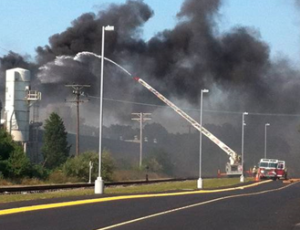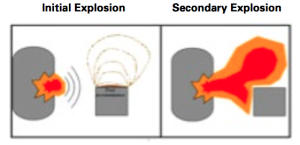
Wood Pellet Plant Explosion (The Providence Journal)
Woodworking facilities have an especially high risk of fires and explosions due to the large quantities of on-site fuel and ignition sources. OSHA outlines the explosive hazards inherent to the woodworking industry and offers multiple solutions to prevent and mitigate these risks. We’ve highlighted some of these hazards and solutions below.
Woodworking Facility Fuel and Ignition Sources
- [Woodworking facilities] contain large quantities of fuel in the form of wood and wood products, sawdust, and flammable materials such as paints, oil finishes, adhesives, solvents, and liquid propane for internal combustion engines. Woodworking facilities are especially at risk for fire due to the abundant production of sawdust, which will ignite and burn far more easily than whole pieces of lumber. Sanders, routers, and shapers in particular produce large amounts of fine dust. Very fine wood dust is especially hazardous. It can accumulate on rafters and other building structural components and in unexpected spots all around your facility, far from the point of generation.
- [Woodworking facilities] contain ignition sources, such as potentially faulty electrical wiring, cutting and welding operations, sparking tools, propellant actuated tools, and employee smoking. There is also the potential for static electrical discharges and lightning.
Possible Solutions
Preventing the buildup of dust is one of the key means for controlling fire and explosion hazards. The principal engineering control technology for control of dust is exhaust ventilation. The primary work practice control is good housekeeping.
Dust collection is best accomplished at the source-at the point of operation of the equipment, if feasible. For many pieces of equipment, well-designed ducts and vacuum hoods can collect most of the dust generated before it even reaches the operator. Very fine dust that manages to escape point-of-source collection can be captured from above by general exhaust points located along the ceiling. These control technologies are effective for most equipment, excepting machines that commonly produce the very finest dust or large quantities of dust.
Good housekeeping extends to periodic hand cleaning of your entire facility, as some dust will escape from even the best exhaust system and will eventually accumulate on rafters and other out-of-the- way spots. Also, it is extremely important to inspect and clean your exhaust ventilation system on a regular basis to maintain maximum efficiency.
Additional Prevention Tips
- Ensure the proper use and storage of flammable materials, such as paints, finishes, adhesives, and solvents.
- Segregate tasks particularly prone to fire and explosion hazards, such as spray painting, welding, and use of powder-actuated nail guns.
- Train employees to recognize, avoid, and correct potentially hazardous conditions and behaviors. Train employees so that they are acquainted with the special equipment and aspects of building design related to dealing with fires and explosions.
- Control ignition sources. This involves using electrical systems rated for the projected use and protected by appropriate circuit breakers, grounding all equipment prone to accumulating static electrical charges, grounding entire buildings against the possibility of lightning strikes, and controlling and banning smoking in and around the workplace. Consult Subpart S of OSHA’s General Industry Standards for more information on electrical design requirements.
- Never permit blow-down of accumulated dust with compressed air. Blowing dust with compressed air will create the very type of dust cloud that presents the greatest explosion hazard.
- Provide continuous local exhaust ventilation on all woodworking machines. The local exhaust systems must have a suitable collector. Dust collection systems must be located outside the building, unless the exceptions described in NFPA standards are met.
- Segregate combustible and flammable materials such as lumber stock and chemical solvents from each other and from ignition sources.
- Ensure that you use equipment with a hazard classification appropriately rated for your work environment.
Protecting Employees
- Install an alarm system to warn for necessary action or safe escape [29 CFR 1910.165].
- Establish emergency plans and fire prevention plans [29 CFR 1910.38].
- Install battery-operated emergency lighting along the floor to aid in the evacuation of smoke- filled buildings.
- Store fire-retardant blankets, clothing, and masks in areas where workers could conceivably need them to pass through smoke and flames to reach exits.
- Maintain first-aid kits designed for the initial treatment of burns and smoke inhalation. These kits should be stored outside the area of fire risk.
The Murray Law Firm works tirelessly to protect Clients who have been injured or lost loved ones in catastrophic factory explosions and fires. In their honor, we urge all woodworking plants and mills to heed OSHA guidelines and make employee safety their first priority. For a complete list of facility hazards and solutions, please visit the OSHA website.
We Fight for Victims of Catastrophic Workplace Accidents in Georgia …Contact us Now for a Free Consultation.
The Murray Law Firm has recovered millions of dollars for victims of catastrophic workplace accidents in Georgia, and we offer our legal assistance if desired. We represent our Clients on a contingency agreement, which generally means that no fees or payments are owed until and unless we recover. Anyone seeking further information or legal representation is encouraged to contact us via e-mail (click here) or by telephone at 888.842.1616. Consultations are free and confidential.
Choosing the Right Attorney
Selecting the right attorney for you or your family is highly important. You must feel confident that the attorney you hire has a complete understanding of the law applicable to your particular case, and has successful experience in handling such cases.
Important: Do not hire a lawyer who has violated the Rules of Professional Conduct!!!
You should not hire an attorney who calls you or visits you unsolicited, or anyone that contacts you directly to offer legal services. This activity is strictly prohibited by Rule 7.3 of the American Bar Association (ABA) Model Rules of Professional Conduct, which states as follows:
 A LAWYER “SHALL NOT” CONTACT A PROSPECTIVE CLIENT THROUGH A “LIVE TELEPHONE” OR AN “IN-PERSON” VISIT.
A LAWYER “SHALL NOT” CONTACT A PROSPECTIVE CLIENT THROUGH A “LIVE TELEPHONE” OR AN “IN-PERSON” VISIT.
– RULE 7.3, ABA MODEL RULES OF PROFESSIONAL CONDUCT.
If an attorney, or someone acting on behalf of an attorney, contacts you in this manner, that attorney is in violation of this Rule. This unethical and unprofessional activity on the part of the lawyer is good sign that you should stay away. It is imperative that you are represented by an attorney who is capable of advocating for you within the confines of the law, and an attorney who fails to abide by the Rules of Professional Conduct is probably not the best fit. In fact, any such attorney should be immediately reported to the local State Bar Association. If you have been contacted in such an unsolicited manner, contact us and we’ll assist you in filing a report.

Contingency Fees Disclaimer: “Contingent attorneys’ fees refers only to those fees charged by attorneys for their legal services. Such fees are not permitted in all types of cases. Court costs and other additional expenses of legal action usually must be paid by the client.”
 Georgia Legal Report
Georgia Legal Report





 Workers Compensation and Car Accidents: Company-Related Motor Vehicle Accidents May Allow for Two Cases
Workers Compensation and Car Accidents: Company-Related Motor Vehicle Accidents May Allow for Two Cases